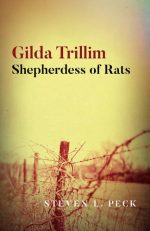Welcome
The Tragedy of King Leere: Goatherd of the La Sals (A Semi-finalist for the National Big Moose Prize by Black Lawrence Press)
Read the Publishers Weekly starred review

What People Are Saying:
“I always speak the truth, even if I must lie to do so.” Thus speaks Steven Peck’s omniscient narrator Asmodeus. And he tells a hell of a story. King Leere is set in the near future in Utah mountains ravaged by climate change (the “koch catastrophe”) and populated by Shakespearean Mormons, human-skinned goats, and battlebots. Asmodeus has been reading Nietzsche and Kierkegaard while adjusting to physical reality in Castle Valley, Utah. He’s a savvy narrator who buries a encomium on a mule’s hoof in a footnote so as not to impede the flow of his fantastic, apocalyptic, and exquisitely romantic narrative. Peck writes with scientific precision and poetic bravura (Leere himself speaks in blank verse!) and his marvelous cautionary tale leaves a reader richer on both counts.
—Scott Abbott
Professor of Integrated Studies,
Philosophy and Humanities at
Utah Valley University
In the Tragedy of King Leere, Steven Peck launches us into a future so haunting and dramatic and frightening, yet infinitely possible. That he makes this future seem so real and “normal” seemed impossible until I figured it out: he’s been there, to the future. And fortunately for us, Steven Peck has come back from the future to tell us what he saw while we still have the chance to avoid it.
Brooke Williams, author of Open Midnight
As if part of the Hogarth Shakespeare’s series where acclaimed novelists of today retell Shakespeare’s works, Steven Peck brilliantly re-envisions Shakespeare’s classic tragedy King Lear. Situated in the majestic landscape of the La Sal mountains in Utah, this is a dystopian, post-apocalyptic and ecologically resonant tale of possession, pride, misrecognition of true love and modesty, of blindness and insight. Peck skillfully entwines it with present-day issues of climactic change and humans’ hurtling towards an apocalypse, thus turning this classic tale into a critique of the primacy of capital over human relationships and basic empathy.
Using humour, irony, and imbuing his novel with a sense of urgency over the fate of the planet, Peck has demon Asmodeus, formerly of Satan’s infernal ranks, now reformed and living in La Sals, telling a “tragic tale framed in a not too distant future… a possible future. One that might be. Or might not be.” Asmodeus is a self-proclaimed omniscient narrator, who nonetheless admits to the limits of his omniscience and who inserts interludes into the story where he waxes philosophical. He playfully expounds on Nietzsche and Kierkegaard, human nature and the possible outcomes of human flaws that are in the tragedy proper personified primarily by Lear and to an extent his offspring. The message however, is a more serious one, for it represents a lament for the planet and life on it, which hypothetically can be salvaged though not thorough human endeavour. Ultimately, the planet will survive once the humans are no longer there.
This is a novel that masterfully combines androids, genetically modified animals, retired infernal demons, legendary tragic characters (King Lear), a post-apocalyptic world with a vividly depicted, almost tangible local landscape of the La Sals, infused with popular culture references from Buffy the Vampire Slayer to Star Trek the Next Generation, but also Ancient Greek and Nordic mythology, Nietzsche and Kierkegaard, cowboys and the Wild West.
Dr. Vanja Polić, Associate Professor, English Department, University of Zagreb, Croatia
Is there room in a King Lear adaptation for battle droids? How about singing gene-modified porcupines and a demon narrator? Enter Peck’s post-apocalyptic world populated by a land baron, his fractious progeny, and his herd of transgenic skin goats. In this futuristic dystopia, the real tragedy is that in a world warped by climate change, most of the characters are still fueled by consumerist greed, except for Delia and her lover, Ellie. But we all know what happens to the good guys. Or do we? Brilliant, imaginative, and wildly entertaining, Peck’s adaptation of Shakespeare will appeal to hardcore bardolaters and those who wouldn’t be caught dead in a theatre. This book is clever, funny, deeply thoughtful, and ambitious. A riot of a read.
Dayna Kidd Patterson, co-editor of Dove Song: Heavenly Mother in Mormon Poetry.
Gilda Trillim wins Association of Mormon Letters 2017 Novel Award
You can buy a copy now!
Gilda Trillim was also named as a finalist for a Whitney Award


BUY Gilda Trillim: Shepherdess of Rats on Amazon
Review: 15 Bytes by Kristina Gibby
Review: Dialogue by Rachel Kirkwood
Podcast: Mormon News Report
Review: Religious News Service by Jana Riess
Review: Association of Mormon Literature–Julie J. Nichols
Review: Segullah–Karen Austin
Review: Association of Mormon Literature–Rachel Helps
Me reading Gilda Trillim at the Mormon Arts Center Festival in New York
![]()
My Background:
I am an evolutionary biologist with a PhD in Biomathematics from North Carolina State University, and an MS in Environmental Biostatistics from University of North Carolina at Chapel Hill. My BS was in Computer Science/Statistics from BYU. My scientific work is in Mathematical and Computer Modeling, Evolutionary Ecology, Entomology, and in Philosophy of Science (the use of computer simulation in ecological systems). I have also published work in Bioethics in related fields.
How then did I become a writer?
I’ve written all my life. Well, actually since 7th grade when I wrote a long narrative poem about a weasel. It was beautiful and touching. My teacher liked it well enough she had me read it to the class. After the class bully who had made my life a torment came up to me, (and I’m not kidding had tears in his eyes) and said, “Peck. That’s the best thing you’ve ever done.” I knew then the power of writing and have done it sense. You be the judge as to whether I was successful.
P.S. I can’t spell.